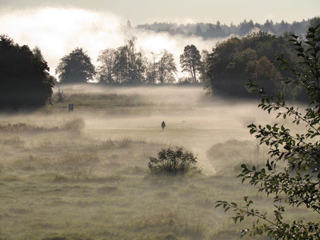It's not really fog, mist or haze. I used to think that it's mist, but from what I've read here, it turns out that it isn't.
It's the white smoke-like fog that is close to the ground. I've seen it recently above a couple of small ponds (and ground) in a damp forest. It was almost as white as smoke, you can barely see through it, but it is close to the ground, from 20cm to a meter or so.
Since it isn't fog (which is a cloud that you can see, say from a mountaintop, and if it's not mist (which is more like 'rain'), then what is it?


